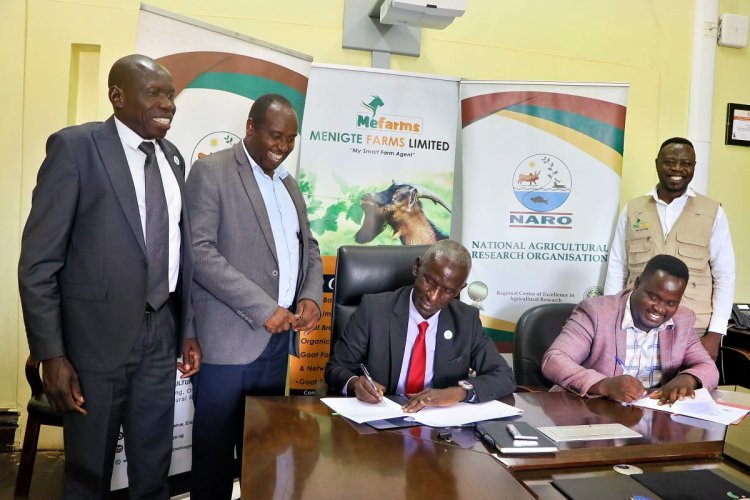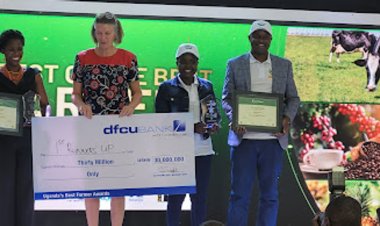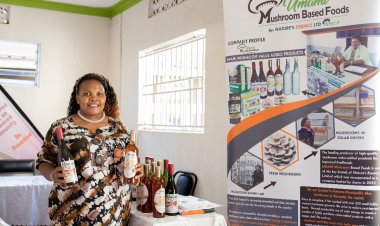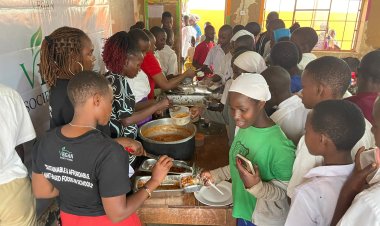NARO Partners with Menigte Farms Limited to Advance Goat Farming

The National Agricultural Research Organisation (NARO) has partnered with Menigte Farms (MeFarms) Limited to revolutionize the goat farming industry across the country.
In a Memorandum of Understanding signed at NARO's headquarters in Entebbe, the two organizations aim to advance research, breeding, management, and commercialization programs for goats, ensuring a reliable and sustainable supply of quality goat products for both domestic and international markets.
The MoU was signed by NARO Director General Dr. Yona Baguma and MeFarms' Managing Director Mr. Kule Brian on behalf of their respective organizations.
By leveraging NARO's extensive research capabilities and MeFarms' practical farming expertise, the initiative aims to transform the goat farming landscape, making it more efficient, profitable, and sustainable.
Dr. Yona Baguma emphasized that the primary goal of the partnership is multipronged designed to boost productivity, improve household incomes especially among smallholder farmers, and spur economic growth at national level.
He said there is opportunity to achieve this through sustainable supply of high-quality goat products to meet the growing demands of both domestic and international markets.
“We will conduct training programs to educate goat farmers on profitable breeding practices. The focus will be on developing high-quality breeds that are disease-resistant, resilient to local conditions, and have a fast growth rate,” Dr. Baguma noted.
The partnership lays the groundwork for the exchange of knowledge between NARO and MeFarms. MeFarms' staff will have field attachments, allowing them to participate in NARO's research projects and gain valuable insights and training.
Additionally, the partnership will focus on developing appropriate feeds and feeding practices to help farmers maximize their profits while ensuring that the goats are fed a healthy diet, enhancing their growth and milk production.
Through collaborative research initiatives aimed at improving goat breeds, management practices, and feed development, data-driven solutions will be developed to meet the needs of the goat farming communities.
MeFarms will play a pivotal role in mobilizing goat farmers within the project focus areas, coordinating project activities, and establishing digital farm records and performance evaluation systems. This data is expected to be integrated into the National Food and Agricultural Statistics System (NFASS) to inform decision-making at the national level.
MeFarms is a Ugandan-registered firm that offers a range of services, including goat banking, goat import and export, goat breeding and trading, organic meat packaging and sales, goat research, consultancy, training, and knowledge bank sharing.
The firm also operates in West Africa.
One of their niche areas is Goat Banking, an innovative investment option for individuals passionate about goat farming but lacking the necessary technical expertise, land, or time to rear goats.
This program allows investors to purchase high-bred goats, typically 87.5% crosses that are 2-3 months pregnant, and have them professionally reared by MeFarms experts in their satellite farms.
MeFarms also imports top-quality, disease-free goats and exports local breeds to promote them internationally. They offer market linkages by supplying fresh, organic goat meat to various markets, including abattoirs, local butcher shops, retailers, hotels, and international markets such as the United States, the Middle East, and the European Union.
Mr. Kule Brian noted that through the partnership with NARO, they envisage driving innovation, improving productivity, and enhancing the livelihoods of smallholder farmers across Uganda.
“As the partnership progresses, it will play a crucial role in supporting Uganda’s agricultural goals, contributing to food security, and driving economic growth,” he added.
The signing was also witnessed by the NARO Deputy Director General for Agricultural Technology Promotion, Dr. Kassim Sadik and the Director Research at NARO’s National Livestock Resources Research Institute, Dr. Samuel Majalija.

































